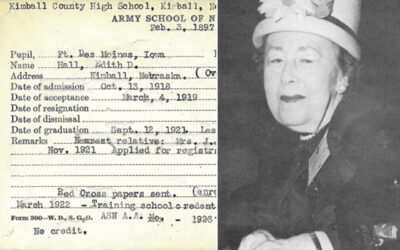By Matt Skoufalos
Like many working nurses, Joni Garcia kicked off her career in health care at an early age – sort of. It all started when she was just six years old. Her older brother had come down with a cold, and Garcia was tasked with an important chore in his recovery.
“My mom’s like, ‘Can you get your brother some water?’ and I was like, ‘Oh my god, I’m going to be a nurse when I grow up,’” she laughed. “I thought I was so cool.”
Whether it was an early moment of prescience or not, Garcia indeed continued into a nursing career. Growing up in the Philippines, she completed a rigorous education track at Far Eastern University in Manila; one that prepared her for the intensity of her later career in the United States. Instructors wouldn’t advance students to the next year of their bachelor’s program without hitting strict benchmarks. Garcia remembers summers spent trying to complete every assignment before the next semester’s enrollment began.
“Before you were graduated to your junior year, you had to birth 20 babies, and then your clinical instructor would sign off on your credentials,” Garcia said. “For your junior year, you had a total of 80 OR cases that you had to finish before you could enroll for your senior year. When I was talking to the nurses here, I was like, ‘You guys didn’t do that?’ ”
Garcia first visited the United States as a tourist in 1999. After she decided to pursue the next stage of her nursing career in America, she completed her U.S. nursing boards, and was sponsored by a Philadelphia, Pennsylvania-based home care company, Visiting Nurse Group. After she was eased into basic home care cases to start her practice, Garcia’s confidence grew as her assignments increased in complexity.
When her contract was up, Garcia caught on with a different home care company before finding a perioperative orientation at Children’s Hospital of Philadelphia (CHOP). While making the rounds through various surgical disciplines, Garcia discovered an interest in orthopedics.
“I wanted to learn how to do the spines,” she said. “The whole entire summer, they put me in a spine room every day to get proficient.”

Garcia has been with CHOP for 12 years. Her current assignment is as a “breaker,” working a 12-hour shift in which “you get thrown anywhere and everywhere,” relieving surgical nurses for their mandatory breaks.
“Whatever the nurse is supposed to be doing in those next 15 minutes, you take over,” she explained. “Then, after the 15 minutes, they came back, and you report back to them – ‘I did your sponges,’ ‘I added an instrument tray,’ ‘I added so many sutures.’ Then, on to the next one.”
In addition to being a pediatric teaching hospital, CHOP is a Level I trauma center, which means Garcia is accustomed to treating patients with complicated chronic medical conditions as well as those with injuries from accidents or other violence. The difficulty and variety of cases she’s seen in her tenure there have given Garcia a level of unflappability that makes her perfectly suited to the breaker role.
“I’m at a point where I’ve done everything except for a liver transplant or a heart transplant,” she said.
 A high-water mark came in 2015, when Garcia participated in the first pediatric double-hand transplant in the world. She recollects that surgery, a tightly orchestrated series of procedures coordinated among four teams, one for each of the donor and recipient hands. The entire operation was completed within nine hours, and today, the patient, nine-year-old Zion Harvey of Baltimore, has gained the independence of two functioning limbs, thanks to their work.
A high-water mark came in 2015, when Garcia participated in the first pediatric double-hand transplant in the world. She recollects that surgery, a tightly orchestrated series of procedures coordinated among four teams, one for each of the donor and recipient hands. The entire operation was completed within nine hours, and today, the patient, nine-year-old Zion Harvey of Baltimore, has gained the independence of two functioning limbs, thanks to their work.
“The last update we had last year, he pitched a baseball at the Baltimore Orioles game,” Garcia said.
In the decade-plus of work she’s done at CHOP, Garcia has left the area for only one assignment: an 18-month stint as a travel nurse in Houston, Texas. In that time, she worked at four different hospitals in the Houston metro area, and focused on adult patients, a contrast to the 12 years she’d spent working in a pediatric environment.
“I thought, ‘There’s so much to learn,’ ” she said. “I truly learned a lot more than what I knew before I’d started traveling. I realized there were things we could be doing differently to improve our workflow.”
To Garcia, continuous education is the hallmark of a nursing professional, and at a teaching hospital like CHOP, her values are aligned with that of the organization. She said the environment is also one in which clear, easy communication is welcomed and even encouraged; one where surgeons are not intimidated by the suggestions of a colleague, and where help isn’t far away when it’s needed.
“Good OR nurses have the ear that you could be doing something else, and part of you is listening out for the anesthesiologist,” Garcia said. “You always have to be on top of your game. Even if I’m doing something, you hear the monitors, or you let the surgeon know. You’re the patient’s advocate.”
She also points out that listening is a two-way street. For as much as she might have a contrary perspective to that of the doctors in the room, Garcia is prepared to accept constructive criticism herself. She said the environment at CHOP supports such effective communication, in part because the length of tenure she’s enjoyed there makes it easy to stay.
“There’s a lot of lifers at CHOP,” Garcia said. “We’ve worked with these surgeons for years. They know you, they know what you can do, and they’ll listen to you. If they need help, people will come in.”










